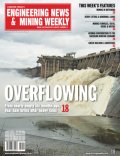Renewable carton packaging to reduce environmental impact


Tetra Pak Southern Africa MD Stefan Fageräng
Tetra Pak Southern Africa MD Stefan Fageräng
The Southern African subsidiary of global food packaging group Tetra Pak is changing its packaging to use materials that are wholly renewable and that meet local and international food safety standards, says Tetra Pak Southern Africa MD Stefan Fageräng.
This programme is part of the group's global initiative to have net zero greenhouse-gas emissions across its operations by 2030.
"We have to innovate with new materials. The first step is to source appropriate materials that are renewable or recycled and can be sustainably exploited without draining the world of resources. Then we need to produce and distribute our packaging in a carbon-neutral way," Fageräng tells Engineering News.
Tetra Pak introduced biobased packaging, which is made from 90% renewable materials, in South Africa in 2019. The packaging includes materials derived from wood and biobased plastic made from sugarcane.
The sugarcane plastics are sourced from Latin America, owing to the lack of local suppliers; however, Fageräng notes that Tetra Pak has been working with the local chapter of the nonprofit sugarcane organisation Bonsucro and the local sugar industry to develop a plan to potentially locally produce input materials for sugarcane plastics.
This could, to an extent, offset a portion of lower consumption of sugar in consumer food products and prepare for the predicted worldwide shortage of sugarcane plastics, but would require investment in various equipment and processes, he says.
Further, Tetra Pak is aiming to use only green energy at its Pinetown factory. "We aim to move our offices off the grid and use only renewable energy".
"We also approached the industries we work in and are cooperating with suppliers along the value chain to move to low-carbon food packaging and transport and to improve the recycling value chain. We aim to have our supply chains operate sustainably by 2050," he says.
In South Africa, Tetra Pak is collaborating with two paper mills to ensure there is sufficient paper recycling capacity in place to allow itself and other competitors to use recycled materials.
It is also cooperating with its competitors to improve fibre recycling and address challenges that hinder recycling to improve the sustainability of the industry.
Further, Tetra Pak has teamed up with four mass retailers in South Africa to use more sustainable packaging and improve recyclable material recovery within their spheres of influence.
"Sustainable packaging requires an element of recycling, but it is not the solution to all the challenges to ensure food packaging is sustainable. Even materials that can be composted or are biodegradable require industrial-scale collection so that it does not end up in the environment," explains Fageräng.
The average beverage carton recycling rate in South Africa is 10%, which must be improved. The challenge is to develop a recycling ecosystem that operates sustainably and leverages the existing collection system and the informal waste recovery economy, as well as help to formalise it to become part of the circular economy.
"Far too much packaging is not yet recycled. Consumers today are mostly aware of the challenges created by pollution, but there are other challenges facing the country, relegating recycling to a lower priority.
"However, in South Africa, we have a good recycling industry in place. There are many recycled materials that we can use more of in South Africa.
"Fortunately, retailers and producers are becoming more responsible as the industry learns more and we are helping to drive behavioural and consumer changes that will benefit society and the planet. Consumers can have a huge impact if they start making different choices."
In the short term, Tetra Pak Southern Africa will continue to use biobased packaging and sugarcane plastics and increase the use of these materials over the next few years.
Additionally, it is testing paper-based straws to replace plastic straws, although the challenge is to deliver the same convenience and experience for consumers.
Over the medium term, the company is moving to 100% renewable materials and aims to remove the aluminium from its packaging, he adds.
"From a Tetra Pak perspective, all countries are moving in the same direction, so we are rolling out our programmes across our markets in Southern Africa. We aim to reduce the environmental impact of our packaging and that of our supply chains to create a situation where we are not adding to greenhouse gas emissions or adding to the problems in the world," concludes Fageräng.
Comments
Press Office
Announcements
What's On
Subscribe to improve your user experience...
Option 1 (equivalent of R125 a month):
Receive a weekly copy of Creamer Media's Engineering News & Mining Weekly magazine
(print copy for those in South Africa and e-magazine for those outside of South Africa)
Receive daily email newsletters
Access to full search results
Access archive of magazine back copies
Access to Projects in Progress
Access to ONE Research Report of your choice in PDF format
Option 2 (equivalent of R375 a month):
All benefits from Option 1
PLUS
Access to Creamer Media's Research Channel Africa for ALL Research Reports, in PDF format, on various industrial and mining sectors
including Electricity; Water; Energy Transition; Hydrogen; Roads, Rail and Ports; Coal; Gold; Platinum; Battery Metals; etc.
Already a subscriber?
Forgotten your password?
Receive weekly copy of Creamer Media's Engineering News & Mining Weekly magazine (print copy for those in South Africa and e-magazine for those outside of South Africa)
➕
Recieve daily email newsletters
➕
Access to full search results
➕
Access archive of magazine back copies
➕
Access to Projects in Progress
➕
Access to ONE Research Report of your choice in PDF format
RESEARCH CHANNEL AFRICA
R4500 (equivalent of R375 a month)
SUBSCRIBEAll benefits from Option 1
➕
Access to Creamer Media's Research Channel Africa for ALL Research Reports on various industrial and mining sectors, in PDF format, including on:
Electricity
➕
Water
➕
Energy Transition
➕
Hydrogen
➕
Roads, Rail and Ports
➕
Coal
➕
Gold
➕
Platinum
➕
Battery Metals
➕
etc.
Receive all benefits from Option 1 or Option 2 delivered to numerous people at your company
➕
Multiple User names and Passwords for simultaneous log-ins
➕
Intranet integration access to all in your organisation















